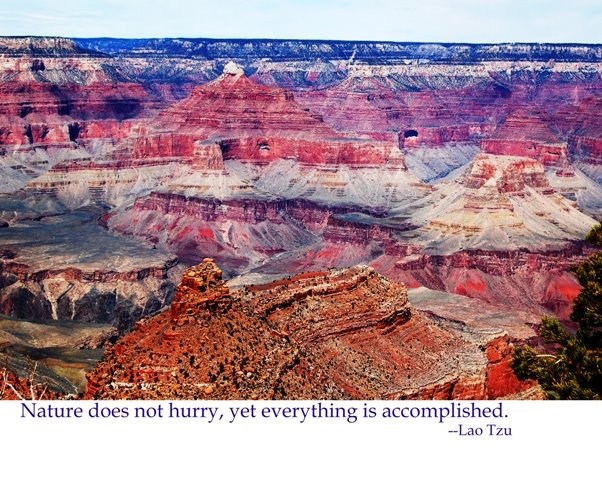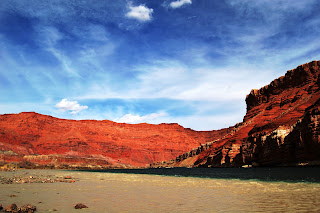When you get down to the riverside, especially at the river's entrance to the canyon, you see a much different river. And this is below the dam that contains the mighty river at Lake Powell.
Today, rafting into the Grand Canyon from Lee's Ferry is a daily adventure taken by amateurs, from pre-teens to octogenarians, with a professional guide of course. They raft the river in large inflatable rafts, holding 6 to 10 passengers. These rafts are next to impossible to overturn, making the journey an adventure that seems dangerous, but is actually only minimally so.
Now, imagine taking the voyage through the canyon in a wooden boat! And the river is at pre-dam levels, with class IV rapids. The year is 1867. There are no towns along the river, so all your food and supplies must be carried on the boats. There is no bridge at Lee's Ferry, so the entrance to this epic adventure is actually in Green River, Utah. You will float for a little more than six weeks before even reaching Lee's Ferry and the entrance to the Grand Canyon. The land around the river is inhospitable high desert, sparsely inhabited. Where there is any human settlement, it is generally Paiute or Ute tribes that really don't welcome white travelers. Unless you are the lucky sort and you come across a Mormon settlement. But then again, after their years of persecution in the East, they don't exactly welcome visitors with open arms. So, once you are on the river, you stay on the river, come Hell or high water. Chances are, you will experience both on this trip.
The leader of the expedition is a Civil War veteran named John Wesley Powell. He has no experience on this stretch of the Colorado, but then again, no one does. He did explore the Mississippi and Ohio rivers as a young man, but that didn't prepare him for the rapids, extreme heat, dangerous Indians, and isolation he experienced on this trip. His crew had little or no experience on this or any other river. They were, a journalist, two hunters, an editor, the editor's son, a cook, a Civil War captain, a Scotsman, and an English adventurer. Oh, and Powell had lost most of his left arm to a minie ball in the battle of Shiloh in the Civil War (the photo below is Powell with a native American on one of his later trips in the area. Old photographs are reversed when printed, so Powell is actually gesturing with his right arm).
The inexperience of the men and their leader was evident almost immediately. They loaded all their food and supplies into two boats, one of which broke apart in their first encounter with rapids only days into the trip. A second boat was heavily damaged, but the men were able to repair it well enough to be used until they reached the real rapids weeks later. They salvaged what food and supplies they could and spread them out amongst their remaining boats for the remainder of their expedition. The men learned and adapted quickly and avoided any further disasters on the water.
They were not prepared for the desolate landscape surrounding them on the high desert though. After the loss of half their food, they were more dependent on game they could hunt along the way. Unfortunately, for most of the journey, there was no game. Powell's diary describe scraping mold off their bacon before eating it; a scene I think of each time I check an expiration on the sliced turkey that has sat in my refrigerator for a week. Three of the men lost confidence in their leader's ability to get them through the canyon in Utah. They left the expedition and climbed out of the canyon to walk to one of the settlements they were sure was only days away on foot. They were never heard from again. Speculation is that they were killed by Paiute Indians who had earlier been attacked by settlers crossing their territory; or possibly massacred by a rogue band of Mormon settlers.
Powell and his remaining men successfully completed their journey through the canyon, mapping areas previously unknown by European settlers. They also had numerous peaceful encounters with native Paiutes, many of whom shared corn and antelope with the travelers. Powell, in this and later extensive travels in the area, completed an important anthropological study of tribes of the American southwest. But his most important and lasting work concerned the land itself and its possible use.
As he learned through firsthand experience, water is the key to surviving and thriving in the American west. He presented numerous recommendations to Washington D.C. on how farming techniques must be modified to be practical in the arid west. He warned that farming techniques used successfully in Ohio and Mississippi would lead to massive erosion during the droughts that were common in the west. Of course his recommendations were largely ignored until after the Dust Bowl days of the early 20th century. He also advised that population growth be discouraged in the area. The entire southwest from western Wyoming, through western Colorado, Utah, Nevada, Arizona, and southern California all depended on one river - the Colorado. Use of its water would necessarily be rationed for life in the area to survive. Once again, he was, and is still ignored. Las Vegas, with its dancing fountains and population of near a million; Phoenix with its green desert golf courses and population of well over a million; and Los Angeles with all its excesses and population of close to two million all depend on the now tame Colorado for their water.
How long will that last?

+with+quote+sized+for+web.jpg)
















